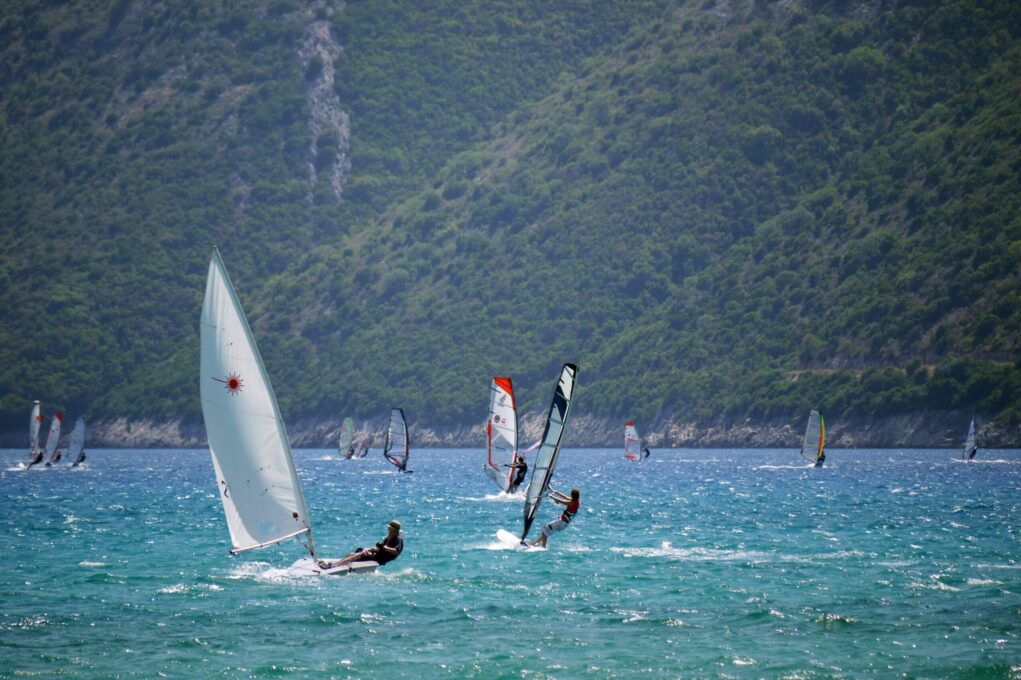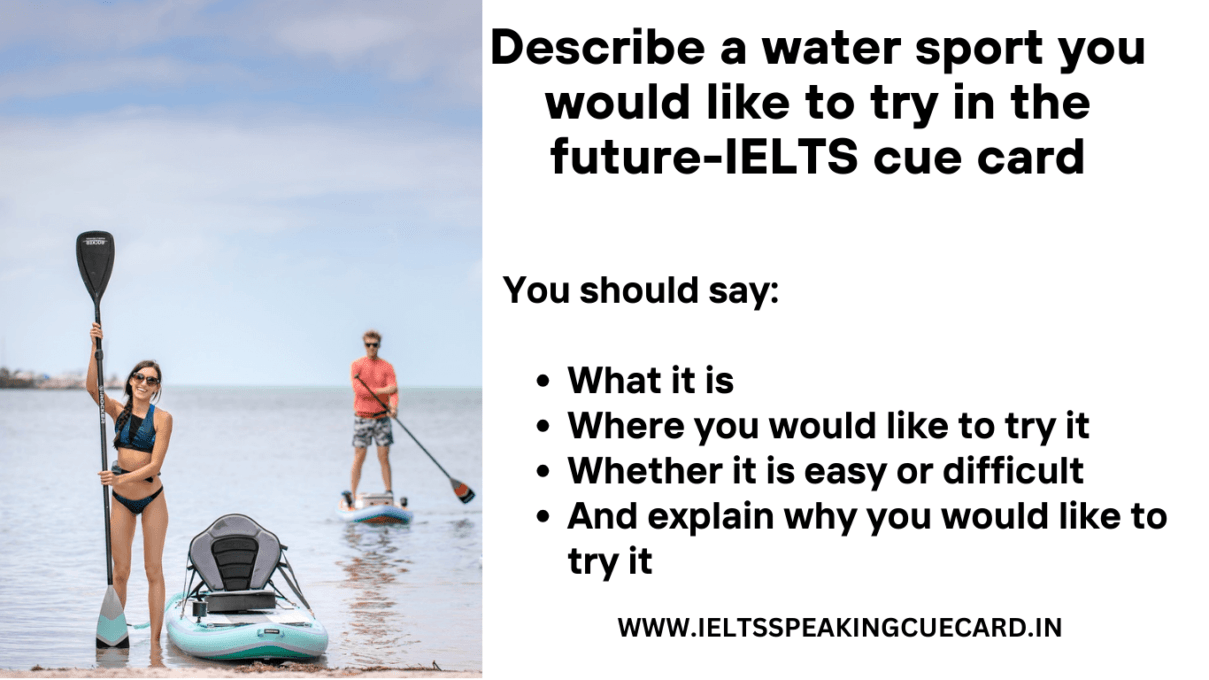Describe a water sport you would like to try in the future
You should say:
- What it is
- Where you would like to try it
- Whether it is easy or difficult
- And explain why you would like to try it
Sample Answer-1

Describe a water sport you would like to try in the future IELTS CUE CARD
Introduction:
One water sport that has always fascinated me is snorkeling. Imagining the underwater world teeming with vibrant marine life and coral reefs, I look forward to experiencing the thrill of snorkeling in the crystal-clear waters of the Andaman Islands.
What it is:
Snorkeling is a captivating water activity where individuals float on the water’s surface, equipped with a mask and a breathing tube, to explore the underwater world. It allows a close encounter with marine life without the need for extensive training or equipment.
Where you would like to try it:
The tranquil and azure waters surrounding the Andaman Islands, known for their rich biodiversity and pristine coral reefs, would be the ideal location for my snorkeling adventure. Exploring the underwater wonders in this picturesque setting promises a memorable experience.
Whether it is easy or difficult:
Snorkeling is relatively easy for beginners, requiring minimal training. The basic techniques, such as breathing through the tube and using fins for propulsion, can be quickly grasped. The simplicity of snorkeling makes it accessible to individuals of various skill levels.
And explain why you would like to try it:
The allure of snorkeling lies in the opportunity to witness the mesmerizing world beneath the waves. The vibrant coral formations, tropical fish darting through the water, and the sense of weightlessness create a magical experience. Snorkeling allows for a direct connection with nature, making it a water sport I eagerly anticipate trying.
Sample Answer-2

Describe a water sport you would like to try in the future IELTS CUE CARD
Introduction:
One water sport that has always piqued my interest is windsurfing. The exhilarating combination of wind, waves, and skillful navigation on a board with an attached sail makes windsurfing a thrilling prospect for a future water adventure.
What it is:
Windsurfing is a dynamic water sport where individuals stand on a board similar to a surfboard, maneuvering it with an attached sail. The wind propels the sail, allowing enthusiasts to glide across the water, performing exciting maneuvers as they harness the power of the elements.
Where you would like to try it:
The coastal regions of Goa, known for their pristine beaches and ideal wind conditions, would be the perfect setting for my windsurfing escapade. The combination of the Arabian Sea’s waters and the coastal winds creates an ideal environment for an exhilarating windsurfing experience.
Whether it is easy or difficult:
While windsurfing may appear challenging at first, with proper instruction and practice, it can become an enjoyable and accessible water sport. Mastering the basics of balance and sail control is key, and once these skills are honed, windsurfing becomes a thrilling and rewarding activity.
And explain why you would like to try it:
The allure of windsurfing lies in the perfect harmony between nature and adventure. The prospect of riding the waves, feeling the rush of the wind, and skillfully navigating the board creates a unique and liberating experience. It’s a perfect blend of adrenaline and tranquility, making it an activity I eagerly anticipate trying.
Follow-up Questions:
1.Why do so many people like going to places near water, such as lakes, rivers, or oceans?
Water bodies offer a natural escape, providing serene landscapes and opportunities for various activities. The calming effect of water, coupled with recreational possibilities, makes these locations popular among people seeking relaxation and enjoyment.
2.What kind of leisure activities do people like to do in places like the ocean, at the beach, river, lake, etc.?
Leisure activities near water often include sunbathing, swimming, beach sports, and water sports like surfing or kayaking. These activities capitalize on the natural beauty and recreational potential of water environments.
3.Do you think children and old people do the same type of things when they go to a beach?
While preferences may vary, both children and older individuals engage in similar activities at the beach, such as building sandcastles, swimming, or enjoying a leisurely stroll. The beach caters to a broad spectrum of age groups and interests.
4.What kind of activities would you do if you were spending leisure time at a beach or near the ocean?
Given the opportunity, I would indulge in a variety of activities, including swimming, beach volleyball, and, of course, trying my hand at windsurfing. Exploring the shoreline, enjoying local cuisine, and capturing the scenic beauty would also be on my agenda.
5.Why do some people like water sports?
Water sports offer a unique blend of physical activity, thrill, and connection with nature. The challenge and excitement of mastering the water, along with the health benefits, make water sports appealing to enthusiasts.
6.Do you think the government should invest money in developing facilities for water sports?
Yes, government investment in water sports facilities can promote tourism, boost local economies, and encourage a healthy and active lifestyle. Well-developed facilities can attract both enthusiasts and novices, contributing to the overall growth of water sports.
7.Which is the most popular water sport in your country?
In my country, India, cricket tends to dominate the sports landscape. However, water sports like cricket, especially in coastal regions, are gaining popularity. Activities such as surfing, kayaking, and water skiing are becoming increasingly prevalent.
8.Why do people like to do things near water?
The proximity to water induces a sense of tranquility and connection with nature. Water bodies provide a refreshing and picturesque backdrop for various activities, creating an environment conducive to relaxation and recreation.
9.Do you think schools should teach students to swim, and why?
Yes, incorporating swimming lessons in schools is crucial for promoting water safety and ensuring that students acquire a life-saving skill. Swimming enhances physical fitness, instills confidence, and prepares individuals for unforeseen water-related situations.
10.Are there many schools teaching swimming?
While the availability of swimming lessons varies, there is a growing awareness of the importance of swimming skills. Efforts are being made to incorporate swimming lessons into school curricula, especially in regions with easy access to water bodies.
11.Why should water transport be developed?
Water transport is environmentally friendly, cost-effective, and can alleviate traffic congestion. Developing water transport infrastructure can enhance connectivity, facilitate trade, and offer an efficient and sustainable mode of transportation.
12.Do you think it is necessary for everyone to learn how to swim?
Yes, learning to swim is a crucial life skill. It not only promotes safety around water but also provides individuals with the confidence to engage in water-related activities, contributing to a healthier and more active lifestyle.
13.What are the advantages of water transportation?
Water transportation is energy-efficient, reduces traffic congestion, and has a lower environmental impact compared to other modes of transport. It facilitates the movement of goods, connects remote areas, and is a vital component of global trade.
14.Why do people like to live near water?
Living near water offers scenic views, a calming environment, and recreational opportunities. Waterfront living is associated with a higher quality of life, providing a sense of tranquility and access to various water-based activities.
15.What kinds of water sports are popular nowadays?
Contemporary water sports gaining popularity include paddleboarding, kiteboarding, wakeboarding, and underwater activities like snorkeling and scuba diving. These sports cater to diverse interests and skill levels, contributing to the overall appeal of water-based recreation.

